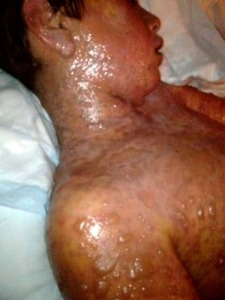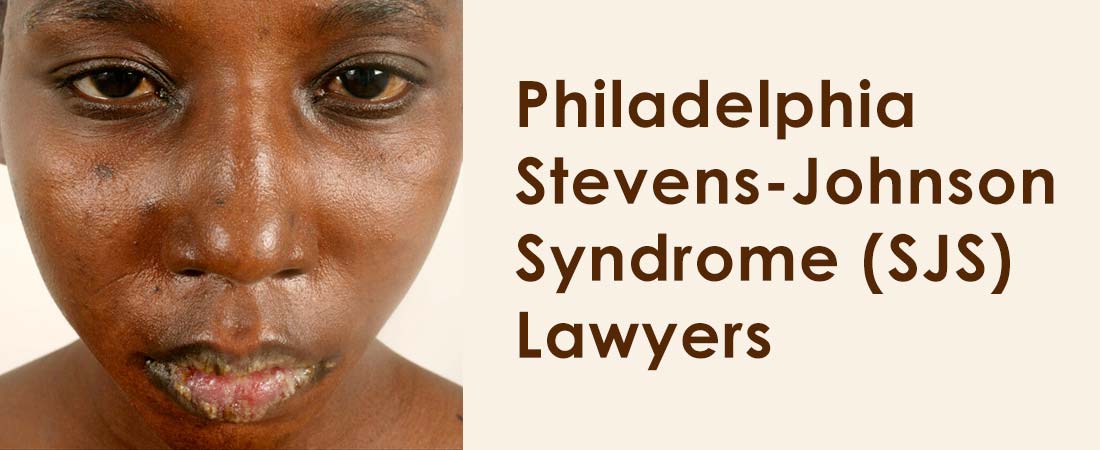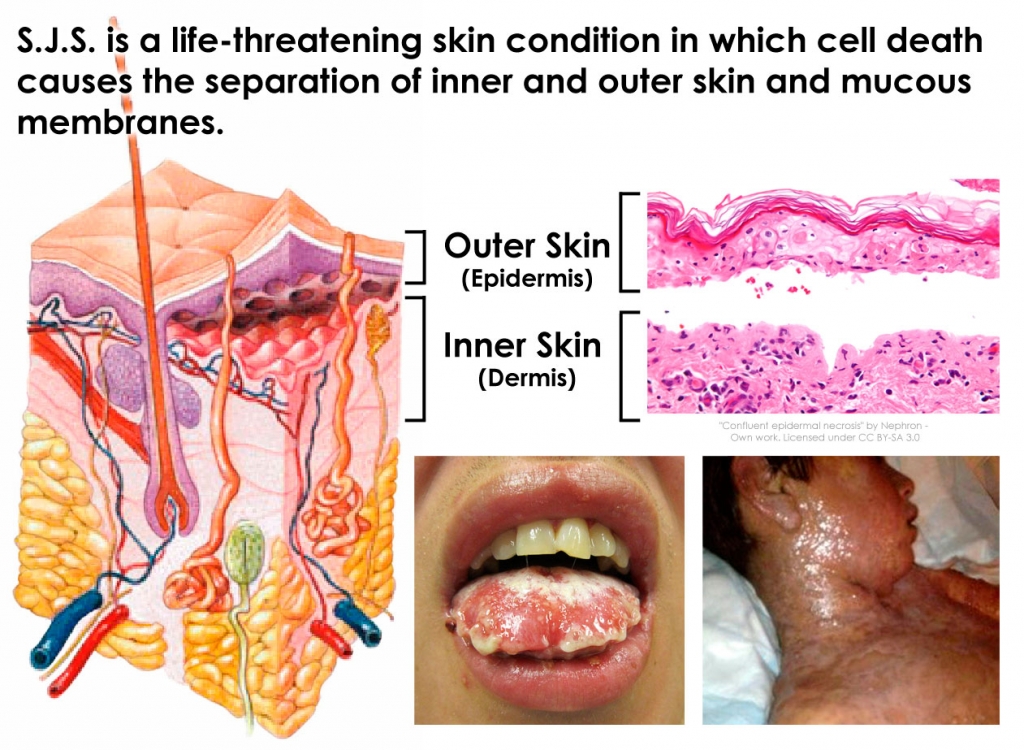What is SJS?
Steven Johnson Syndrome is an autoimmune reaction that the body has to certain drug metabolites. As the drug breaks down into molecules in the body, the molecules attach to skin and mucous membrane cells and trick the body into thinking that these cells are foreign to the body. Since the immune system no longer recognizes affected skin and mucous membrane, it attacks and kills the cells. As more metabolites are available, more cells are killed causing an injury that is akin to a burn. If the offending medication is continued, it is like pouring gasoline on a fire and the damage to the skin and mucous membranes becomes widespread and severe.
SJS presents itself first as the flu, with fever, chills and lesions on the epidermis, the outer layer of the skin. As more cells are affected, these lesions begin to grow, and cause the skin to peel off in large pieces, leaving patients susceptible to infection, and scarring. SJS also affects the mucous membranes, which can result in blisters on the cornea of the eye, scarring, holes in the cornea and blindness. It can also affect the mucous membranes of the mouth, throat, airways, urinary tract, vagina and anus. SJS is a life threatening disease because of the severe damage it can cause to the skin and mucous membranes. If allowed to progress, and the lesions cover over 30 % of the body, the patient is categorized as suffering from toxic epidermal necrolysis, or TEN, the continuum and most severe form of SJS. Over 30% of the patients who are diagnosed with TEN die from this condition.
SJS and TEN are almost always triggered by medications.
What Medications Can Cause SJS?
Medications are the leading trigger of SJS/TEN in both adults and children. The risk of SJS/TEN seems to be most prevalent during the first eight weeks of treatment. The typical exposure period before reaction onset is four days to four weeks of first continuous use of the drug.
- Allopurinol
- Antiseizure medications and lamotrigine
- Antibiotics (including Sulfasalazine)
- Nevirapine
- Certain nonsteroidal anti-inflammatory drugs (NSAIDs)
SJS/TEN has also been attributed to penicillins, particularly amoxicillin or ampicillin. Several conventional and targeted anticancer therapies have been associated with SJS/TEN, including thalidomide , capecitabine , afatinib , vemurafenib, tamoxifen, and immune checkpoint inhibitors (ipilimumab, pembrolizumab, nivolumab).
All of these medications carry with them an FDA warning to prescribers giving them notice of the risk of SJS/TEN. This is because early diagnosis and discontinuation of the offending drug is the key to a good recovery.
SJS Symptoms
SJS usually presents with a fever often exceeding 39°C (102.2°F), and influenza-like symptoms precede by one to three days the development of mucocutaneous lesions. Signs and symptoms that should alert the clinician to the possibility of SJS/TEN include fever >38°C (100.4°F), mucositis, skin tenderness, and blistering. Mucosal involvement occurs in approximately 90 percent of cases of SJS/TEN and can precede or follow the skin eruption. Eye involvement is reported in approximately 80 percent of patients. The most common change is severe inflammation of the eye with a purulent discharge and blisters may develop. Pain and sensitivity to light are often present.
In children, the medications most often associated with SJS/TEN are sulfonamide antimicrobials, phenobarbital, carbamazepine, and lamotrigine. Cases associated with acetaminophen/paracetamol (Tylenol) and ibuprofen have also been reported.
Philadelphia SJS Lawyers
Although Steven Johnson Syndrome is rare, the lawyers at Feldman & Pinto have extensive experience prosecuting cases for clients nationwide. Our lawyers have pursued cases against the drug manufactures and prescribers who have failed to discontinue the offending drug once SJS symptoms have appeared.

When the child failed to improve his mother took him back to the same ER. Upon arrival, the child had very dry lips, a sore throat, and a headache. The child’s physical examination reported very dry mucous membranes, numerous oral ulcers, exudate on tonsils bilaterally, oropharynx erythematous and ulcers along the gum line and lips. The child also had purulent discharge from both eyes and was unable to take liquids.
Despite considering SJS as a possible source of the child’s symptoms, and an FDA warning to the physicians to discontinue Tylenol/Motrin, if the patient suffers from skin reddening or rash, the medications should be immediately discontinued, the physicians continued to administer Tylenol and Motrin to the child. Both Tylenol and Motrin have been associated with SJS and carry an FDA warning regarding SJS and direction to discontinue the medication and seek medical attention if a skin reaction develops. Every dose of the culprit drug increases the amount of metabolite in the child’s body and causes more damage.
For patients suspected to have SJS/TEN, the identification of the causative drug is essential because early withdrawal of the offending agent may improve the prognosis. In addition, the identification of the culprit drug is of paramount importance to prevent re-exposure in patients recovering from SJS/TEN. Prompt identification and withdrawal of the offending agent improves the prognosis.
Links, Additional Information:
- Lawsuits put focus on Ibuprofen for children (Seattle Times)
- Family awarded $63 million in Motrin case (Boston Globe)
- Teenager nearly killed by a dose of ibuprofen is dealt a second blow as doctors reveal he’s going BLIND (Daily Mail)
- Stevens Johnson Syndrome Foundation
- Lawsuit Claims Child’s Stevens-Johnson Syndrome Due to Children’s Motrin (WebMD)
- Stevens Johnson Syndrome (Mayo Clinic)
- encyclopedia.com SLS
- emdocs.net/sjs-ten-pediatric-population/
- en.wikipedia.org/wiki/Stevens-Johnson_syndrome
Contact our Philadelphia Stevens-Johnson Syndrome Lawyers
Feldman and Pinto are representing SJS cases nationwide, referrals are being accepted for cases involving SJS/TEN. If you feel like you haven’t been treated promptly, please contact our office to see if we can be of any help.
NEXT: Philadelphia Thrombocytopenia / HIT Lawyers


